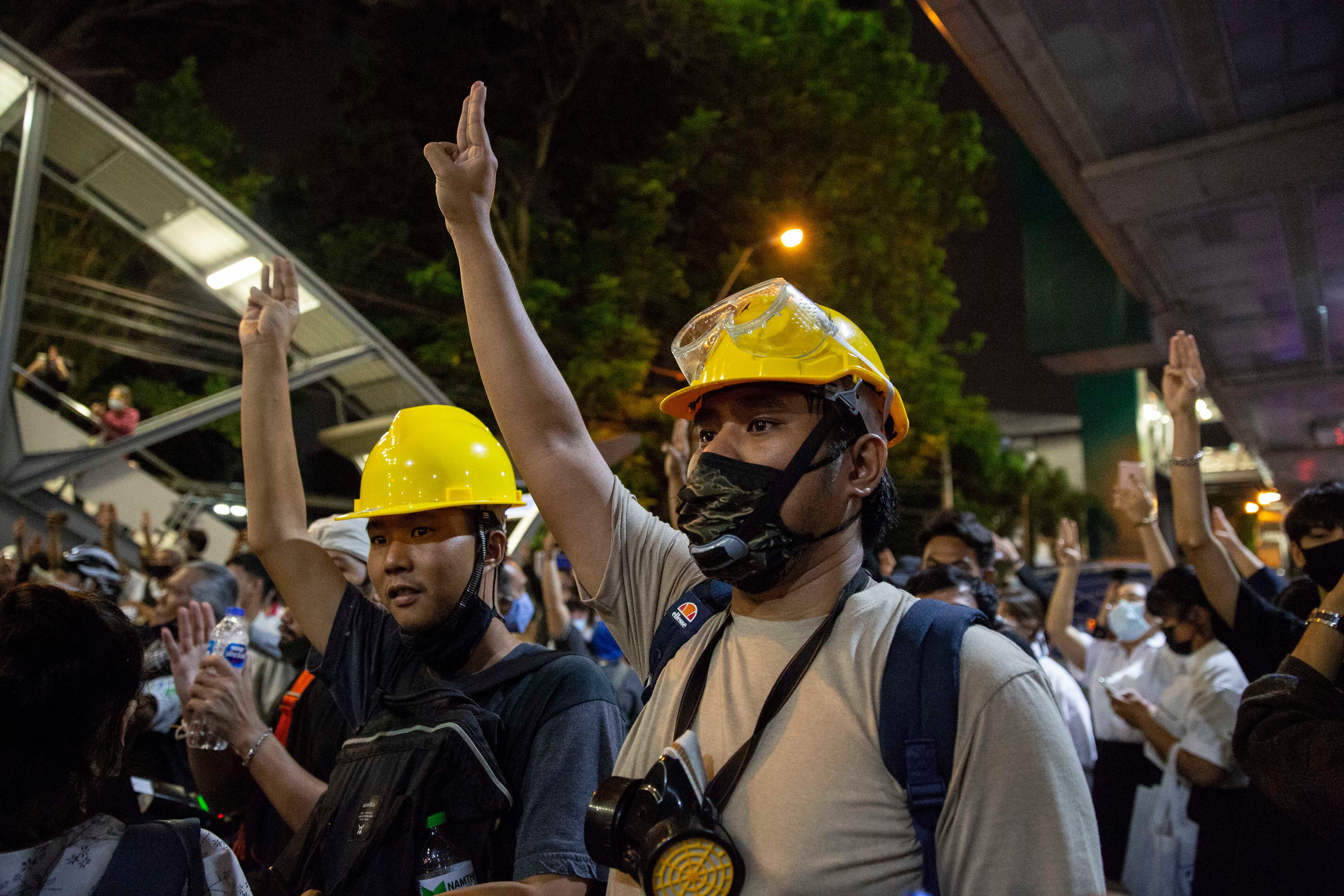'Freedom, liberty and fraternity': Why Thailand's protesters use the Hunger Games salute
Three-finger salute has become a common sight on streets of Bangkok in recent weeks, as protesters defy an emergency order from the government

Real-life news events are often reimagined as stories for the silver screen – but in the case of the growing Thailand protests, inspiration appears to be flowing the other way.
The student-led demonstrations are calling for the military-backed prime minister Prayut Chan-o-cha to resign and for curbs on the powers of a monarchy still much-revered by older generations.
And in The Hunger Games, the story of a young girl from a poor district who leads a revolution against the rich and powerful centre, activists appear to have found a symbol to unite behind.
The three-finger salute has become a common sight on the streets of Bangkok in recent weeks, even as the government has declared a state of emergency to ban people from gathering – orders which many have defied.
But the symbol’s use in Thailand actually dates back to 2014, when it first appeared in defiance of the coup by then-general Prayut. Prayut installed a military junta to run the country for five years, until a 2019 general election held on the basis of a controversial military-drafted constitution, which he won.
The May 2014 coup came between the release of two blockbuster Hunger Games movies – the second and third instalments in the series – and the symbolism of the solute in Thailand was not lost on the police, who immediately arrested those deploying it.
Speaking to the BBC in November 2014, Bangkok activist Than Rittiphan said it was the very fact that the government cracked down so “aggressively” on the three-finger protest that made it so widely adopted.
“The three-finger salute has come to represent the values of freedom, liberty and fraternity in this country,” he said at the time. “We are putting it up to show we are not the object of tyranny and abuse. We will fight until our last stand, we will continue until they take life away from us.”
The symbol was so successful that it was formally adopted by an opposition party, the Future Forward party, which was formed in 2018 and went on to win 80 parliamentary seats in the 2019 vote, making it the third-largest.
However the party was dissolved earlier this year after a court ruled its leader, a wealthy young businessman named Thanathorn Juangroongruangkit, had illegally donated £4.5m to the cause and called it a loan. Mr Thanathorn said it was the only way to finance the party, and that the court’s decision was politically motivated.
Erich Parpart, a journalist with the Thai Enquirer, told The Independent the three-finger salute could trace its origins to the French Revolution – in the trinity of freedom, fraternity and equality – but that most protesters now only know it as the Hunger Games salute.
It now performs a practical purpose, as well as simply being a symbol, he said. “The protestors also use it to identify suspected plainclothes police.”
And it isn’t the only example of Thai protesters taking inspiration from popular culture. They have also been seen dressing up or using references to Harry Potter and popular Japanese cartoon characters like Hamtaro and Naruto.
Hamtaro, the cartoon hamster, inspired themed rallies in July where protesters ran around public places in circles, like a hamster wheel, while singing a modified version of the cartoon’s jingle, singing that the government loves feasting on taxpayers’ money.
“Young people grew up with these popular culture characters and they help add new dimensions to our movement, making it relatable and easy to communicate with young people,” 21-year-old Jutatip Sirikhan, president of the Student Union of Thailand, told Reuters at the time.
The Harry Potter link is simple, Parpart says – King Maha Vajiralongkorn has become like the villain Voldemort, often referred to in the books as “You Know Who” or “He Who Must Not Be Named”, because of the lese majeste (insulting the monarch) laws that make it illegal to insult, defame or threaten the king.
“In the [Harry Potter] movie people lived in fear of saying [Voldemort’s] name – it’s like here, where people who want to disagree [with the king] cannot speak out because of the law, said Parpart. “Anon [Numpha] who led that protest decided to use the movie … and kids here know Harry Potter very well.”
Join our commenting forum
Join thought-provoking conversations, follow other Independent readers and see their replies
Comments



Bookmark popover
Removed from bookmarks